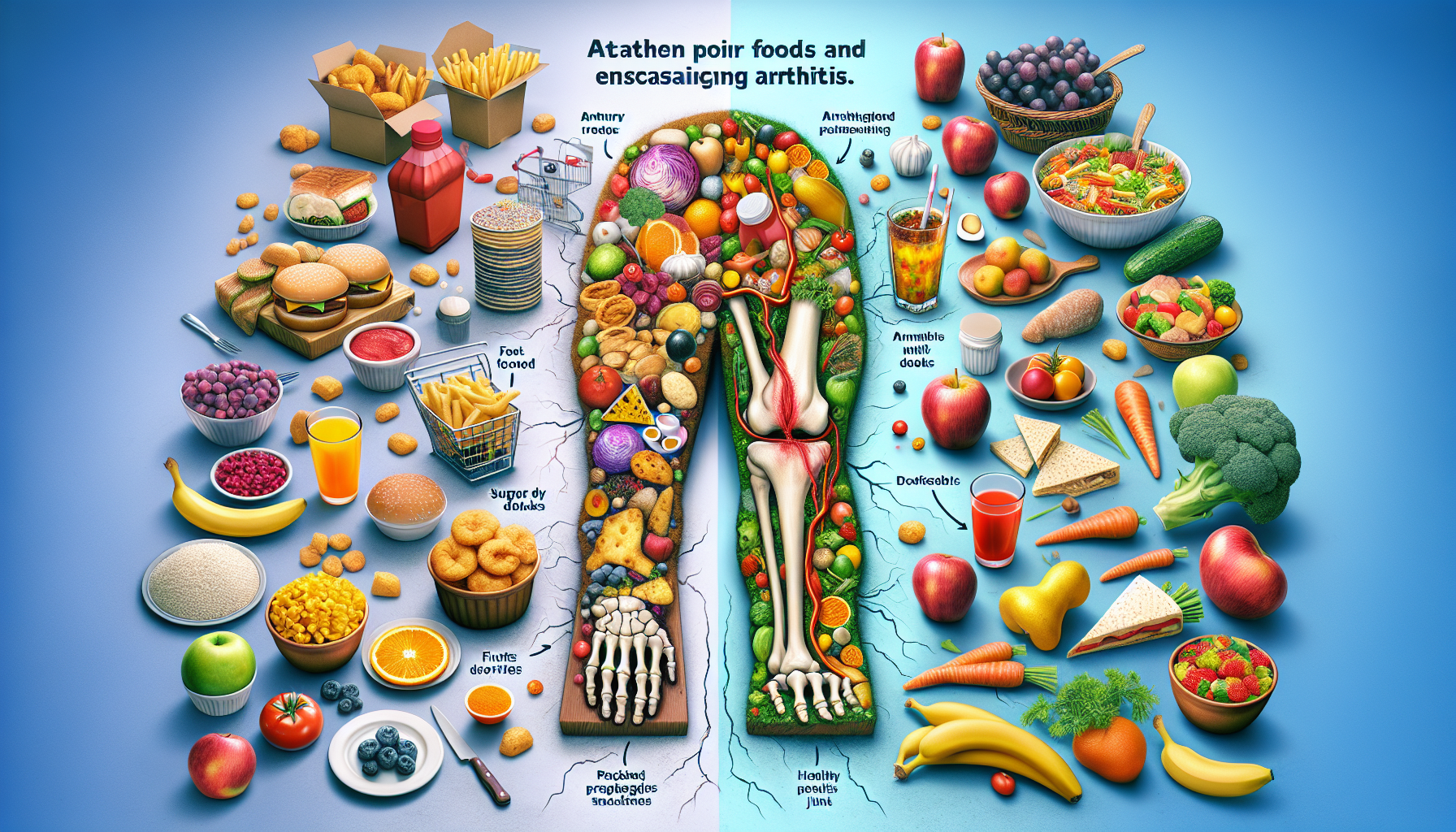Is what you eat impacting your arthritis symptoms? Recent scientific studies have shown a potential link between an unhealthy diet and the aggravation of arthritis symptoms. One study conducted at the University of Dundee found that individuals with a diet high in processed foods, saturated fats, and sugars experienced a higher level of inflammation and joint pain. Another study from the University of Birmingham discovered that a diet rich in fruits, vegetables, and fish had a positive effect on reducing inflammation and improving joint function in arthritis patients. These findings highlight the importance of maintaining a nutritious diet to help manage arthritis symptoms effectively.

Discover the Ultimate Weight Loss Secrets Here!
The Relationship Between Diet and Arthritis
Introduction to the topic
You may not realize it, but what you eat can have a significant impact on your arthritis symptoms. The foods you consume can either help to alleviate pain and inflammation or worsen your condition. In this article, we will explore the connection between diet and arthritis, discussing the effects of processed foods, sugar, omega-6 fatty acids, antioxidants, acidic foods, alcohol, dairy products, and gut health on arthritis symptoms. Understanding the relationship between diet and arthritis is crucial for effectively managing your condition and improving your quality of life.
Overview of arthritis
Before delving into the specifics of diet and its impact on arthritis, it is important to understand what arthritis is. Arthritis is a chronic condition characterized by joint inflammation, pain, and stiffness. There are over 100 different types of arthritis, with the most common being osteoarthritis and rheumatoid arthritis. While osteoarthritis is caused by wear and tear on the joints over time, rheumatoid arthritis is an autoimmune disorder where the immune system mistakenly attacks the joints. Both types of arthritis can be debilitating and significantly affect a person’s daily life.
Link between diet and arthritis
Emerging evidence suggests a strong link between diet and arthritis symptoms. Various scientific studies have been conducted to investigate the impact of diet on arthritis, and they have provided valuable insights. For example, a recent study published in the Journal of Aging and Health found that individuals with arthritis who consumed high levels of processed foods experienced increased joint pain and inflammation. Another study published in the Journal of Nutritional Biochemistry revealed that excessive sugar consumption led to higher levels of inflammation and joint stiffness in arthritis patients.
Effects of Processed Foods on Arthritis
High levels of inflammation
Processed foods, such as fast food, packaged snacks, and sugary beverages, are notorious for their high levels of inflammatory ingredients. These include refined carbohydrates, trans fats, and added sugars. When consumed in excess, these ingredients trigger an inflammatory response in the body, exacerbating arthritis symptoms. The inflammatory chemicals released can further damage the joints, leading to increased pain and swelling.
Increased joint pain
In addition to the inflammation caused by processed foods, they can also directly contribute to increased joint pain. Many processed foods contain high levels of omega-6 fatty acids, which have pro-inflammatory properties. When these fatty acids accumulate in the body, they can promote the production of inflammatory chemicals that intensify arthritis pain.
Impact on disease progression
Furthermore, a diet rich in processed foods can negatively impact the progression of arthritis. The excessive consumption of processed foods has been associated with higher disease activity in rheumatoid arthritis patients. These foods not only contribute to inflammation but also lead to weight gain and obesity, which can strain the joints and worsen arthritis symptoms. Thus, reducing processed food intake is crucial for managing arthritis effectively.
Click Here for Proven Fat-Burning Strategies!
The Role of Sugar in Arthritis Symptoms
Inflammatory response
Sugar consumption has been linked to increased inflammation throughout the body, including the joints. When you consume excess sugar, it triggers an inflammatory response as your body releases cytokines, which are proteins involved in inflammation. This chronic low-level inflammation can exacerbate arthritis symptoms and contribute to disease progression.
Joint stiffness and swelling
High sugar intake has also been associated with joint stiffness and swelling in individuals with arthritis. The elevated levels of sugar in the bloodstream can lead to the production of advanced glycation end products (AGEs). These AGEs can cause the proteins in the joints to become stiff and less elastic, leading to increased stiffness and reduced joint mobility.
Effects on weight and obesity
Sugar consumption plays a significant role in weight gain and the development of obesity, which can have detrimental effects on arthritis symptoms. Excess weight puts additional stress on the joints, causing increased pain and inflammation. It is crucial for individuals with arthritis to limit their sugar intake to help manage their weight and alleviate joint discomfort.
The Influence of Omega-6 Fatty Acids on Arthritis
Pro-inflammatory properties
Omega-6 fatty acids are essential fats that the body needs for proper functioning. However, an imbalance between omega-6 and omega-3 fatty acids can promote inflammation. The typical Western diet is often high in omega-6 fatty acids due to the widespread use of vegetable oils, such as soybean oil and corn oil. This disproportionate intake of omega-6 fatty acids can contribute to chronic inflammation and worsen arthritis symptoms.
Imbalance with omega-3 fatty acids
To counterbalance the pro-inflammatory effects of omega-6 fatty acids, it is important to consume an adequate amount of omega-3 fatty acids. Omega-3 fatty acids have anti-inflammatory properties and can help reduce joint pain and inflammation in arthritis patients. Foods rich in omega-3 fatty acids include fatty fish like salmon, sardines, and mackerel, as well as chia seeds, flaxseeds, and walnuts. Striving for a balanced ratio of omega-6 to omega-3 fatty acids is crucial for managing arthritis symptoms effectively.
Potential impact on arthritis symptoms
Emerging research suggests that reducing omega-6 fatty acid intake while increasing omega-3 fatty acids may lead to improvements in arthritis symptoms. One study published in the Journal of Nutrition found that a lower ratio of omega-6 to omega-3 fatty acids was associated with reduced inflammation and disease activity in rheumatoid arthritis patients. By consciously choosing healthier fats and incorporating omega-3-rich foods into your diet, you can potentially alleviate arthritis symptoms and improve your overall well-being.

Unlock Your Path to a Healthier You!
Antioxidants and Their Effect on Arthritis
Reduction of inflammation
Antioxidants play a crucial role in fighting inflammation and protecting the body against oxidative stress. Oxidative stress occurs when there is an imbalance between free radicals and antioxidants in the body, leading to cellular damage and increased inflammation. Consuming foods rich in antioxidants, such as fruits, vegetables, and whole grains, can help reduce inflammation and alleviate arthritis symptoms.
Protection against joint damage
Arthritis is often associated with joint damage caused by inflammation and oxidative stress. Antioxidants help protect against this damage by neutralizing free radicals and reducing oxidative stress. Studies have shown that individuals with higher antioxidant levels in their diets have a lower risk of developing arthritis and experience less severe symptoms.
Beneficial food sources
To incorporate more antioxidants into your diet, focus on consuming a variety of colorful fruits and vegetables. Blueberries, strawberries, kale, spinach, and bell peppers are excellent sources of antioxidants. Additionally, green tea, nuts, and whole grains are beneficial additions to an arthritis-friendly diet. By prioritizing these antioxidant-rich foods, you can support your body in managing arthritis symptoms and promoting overall health.
The Impact of Acidic Foods on Arthritis
Increased pain and inflammation
Some individuals with arthritis may find that consuming acidic foods exacerbates their symptoms. Acidic foods, such as citrus fruits, tomatoes, and vinegar, can increase pain and inflammation in the joints for certain individuals. It is important to note that not everyone with arthritis will experience this sensitivity, and individual reactions vary. Keeping a food diary and tracking your symptoms can help identify any connections between acidic foods and arthritis flare-ups.
Cartilage degradation
High acidity levels in the body may contribute to cartilage degradation, which worsens arthritis symptoms. Acidic foods can lead to higher acid levels in the bloodstream, causing the body to extract calcium from the bones to neutralize the acidity. This process can weaken the bones and put additional stress on the joints, leading to increased pain and joint damage.
Recommendations for acidic food consumption
While some individuals may experience sensitivity to acidic foods, it does not mean that all acidic foods should be eliminated from the diet. It is advisable to determine your individual tolerance through self-monitoring and consultation with a healthcare professional. Moderation is key, and balancing acidic foods with alkaline foods can help maintain a healthy pH level in the body. Aim to include foods like leafy greens, almonds, and berries, which have alkaline properties, and consider cooking methods that balance acidity, such as marinating acidic foods or cooking them at a lower temperature.

The Role of Alcohol in Arthritis Symptoms
Increased joint inflammation
Alcohol consumption can have a detrimental effect on arthritis symptoms, particularly when consumed in excess. Alcohol is known to increase inflammation levels in the body, which can lead to heightened pain and swelling in arthritic joints. Individuals with arthritis are already dealing with chronic inflammation, and excessive alcohol consumption can exacerbate this inflammation, making symptoms more severe.
Interference with medications
Another concern with alcohol consumption for arthritis patients is its potential to interfere with medications. Many arthritis medications, such as nonsteroidal anti-inflammatory drugs (NSAIDs) and disease-modifying antirheumatic drugs (DMARDs), can cause side effects when combined with alcohol. These side effects may include an increased risk of gastrointestinal bleeding or liver damage. It is essential to consult with your healthcare provider about the potential interactions between alcohol and your medications.
Moderate alcohol consumption recommendations
While excessive alcohol consumption can worsen arthritis symptoms, moderate alcohol consumption may not pose significant risks. Moderation is generally defined as up to one drink per day for women and up to two drinks per day for men. However, it is vital to remember that alcohol affects individuals differently, and some may be more sensitive to its effects. If you choose to consume alcohol, do so in moderation and be mindful of its potential impact on your arthritis symptoms.
The Connection Between Dairy Products and Arthritis
Pro-inflammatory properties
Dairy products, such as milk, cheese, and yogurt, contain proteins called caseins, which can trigger an inflammatory response in the body. For individuals with arthritis, consuming these pro-inflammatory proteins may exacerbate their symptoms. Some studies have shown a correlation between dairy consumption and increased pain and joint inflammation in arthritis patients.
Potential exacerbation of symptoms
In addition to their pro-inflammatory properties, dairy products may worsen arthritis symptoms due to lactose intolerance or other sensitivities. Some individuals with arthritis may experience digestive issues, such as bloating, gas, or diarrhea, when consuming dairy products. These digestive disturbances can potentially worsen arthritis symptoms, leading to increased pain and discomfort.
Alternatives and personal tolerance
If you find that dairy products worsen your arthritis symptoms, you may want to consider eliminating or reducing your consumption. Fortunately, there are numerous dairy alternatives available, such as almond milk, coconut milk, and oat milk. These options can provide similar nutritional benefits without the potential inflammatory effects of dairy. Additionally, it is important to note that individual tolerance to dairy may vary. Some individuals with arthritis may be able to tolerate small amounts of dairy without experiencing adverse effects. It is advisable to listen to your body and pay attention to how dairy products impact your arthritis symptoms.

Gut Health and Arthritis Symptoms
The gut microbiome
The gut microbiome, which consists of trillions of microorganisms living in the digestive system, plays a crucial role in overall health, including the management of arthritis symptoms. Emerging research has shown a link between the gut microbiome and the immune system, suggesting that imbalances in the gut microbiome can contribute to autoimmune diseases like rheumatoid arthritis.
Influence on systemic inflammation
A healthy gut microbiome helps regulate the immune system and maintain a balanced inflammatory response. When the gut microbiome is disrupted, it can lead to dysbiosis, an imbalance of beneficial and harmful bacteria. Dysbiosis has been associated with increased systemic inflammation, which can exacerbate arthritis symptoms. Additionally, imbalances in the gut microbiome can contribute to intestinal permeability, often referred to as “leaky gut,” which allows toxins and bacteria to leak into the bloodstream, triggering an immune response and promoting inflammation.
Importance of a healthy gut
Maintaining a healthy gut is crucial for individuals with arthritis. Consuming a balanced diet rich in fiber, fermented foods, and probiotics can support the growth of beneficial gut bacteria. Foods like yogurt, sauerkraut, kombucha, and kefir can provide probiotics that help enhance gut health. Additionally, reducing the consumption of processed foods, sugar, and alcohol can help reduce the growth of harmful bacteria in the gut. Taking care of your gut health can have a positive impact on your arthritis symptoms and overall well-being.
Conclusion
The relationship between diet and arthritis is undeniable. The foods you choose to consume can either alleviate or worsen your arthritis symptoms. Processed foods, sugar, omega-6 fatty acids, acidic foods, alcohol, and dairy products have all been shown to have the potential to exacerbate inflammation and contribute to joint pain. On the other hand, incorporating antioxidants, maintaining a balanced omega-6 to omega-3 fatty acid ratio, and promoting gut health can have profound benefits for arthritis management.
By making conscious choices about your diet, you have the power to improve your arthritis symptoms and enhance your quality of life. Consider consulting with a healthcare professional or registered dietitian who specializes in arthritis to develop a personalized dietary plan tailored to your needs. Remember, small changes in your diet can make a big difference in managing your arthritis effectively. Start today and take control of your health.

